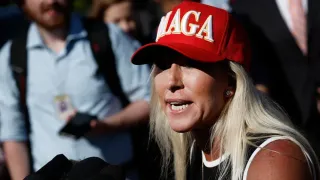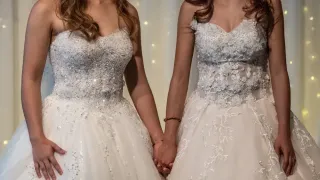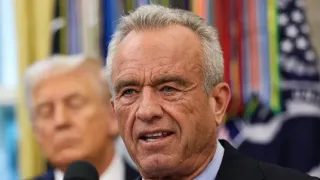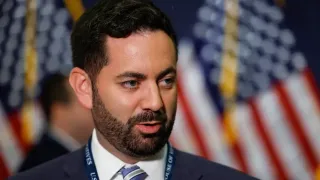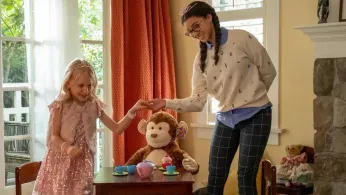
4 hours ago
Marjorie Taylor Greene Cancels Netflix Over Trans Representation in "The Baby-Sitters Club"
READ TIME: 4 MIN.
On October 1, 2025, Georgia Congresswoman Marjorie Taylor Greene publicly declared she was canceling her Netflix subscription, citing concerns over content she described as promoting “transgenderism on kids.” Greene’s decision was prompted by a clip from the children’s series "The Baby-Sitters Club," originally aired in July 2020, that depicted a transgender girl named Bailey, portrayed by trans youth activist Kai Shappley, being supported in a hospital setting by another character, Mary Anne. Greene reposted the clip from the conservative X (formerly Twitter) account Libs of TikTok, which accused the show of “shaming characters for ‘misgendering’ and demands hospital staff refer to and treat a boy as a girl” .
HOLY SHIT. Show on @Netflix “The Baby-Sitters Club" pushes TRANSGENDERISM on KIDS, shames characters for "misgendering" and demands hospital staff refer to and treat a boy as a girl.
INSANITY
This show is rated for CHILDREN
CANCEL NETFLIX pic.twitter.com/wEculUEgkM
— Libs of TikTok (@libsoftiktok) October 1, 2025
Greene captioned her reposted video simply: “Yep canceled.” Her post quickly gathered support from other right-wing users, many of whom echoed her boycott of Netflix and criticized the platform’s inclusion of LGBTQ+ characters and narratives in its programming. The episode in question, “Mary Anne Saves the Day,” was part of the show’s first season and aired five years prior to Greene’s announcement .
Greene’s action is the latest in a series of similar boycotts by conservative public figures and commentators. The calls to cancel Netflix gained momentum following posts from Libs of TikTok, a social media account with a history of criticizing LGBTQ+ representation in media. The account has repeatedly targeted shows like "The Baby-Sitters Club" and "Dead End: Paranormal Park," accusing them of pushing “transgender ideology” and “sexualising children” .
Elon Musk, CEO of X and Tesla, also announced he had canceled his own Netflix subscription after Libs of TikTok criticized the trans-inclusive animated series "Dead End: Paranormal Park," which had already been discontinued by Netflix years earlier. Musk, who has a transgender daughter, has publicly criticized several programs for their LGBTQ+ content and encouraged his millions of followers to join the boycott. Another U.S. representative, Tim Burchett, threatened to subpoena Netflix executives to testify before Congress regarding the platform’s LGBTQ+ content .
The backlash against Netflix and other platforms for LGBTQ+ representation is part of a broader trend among some right-wing groups to oppose what they perceive as “ideological programming” in children’s media. Social media accounts such as Gays Against Groomers have joined the criticism, particularly targeting shows with transgender characters and storylines .
The controversy has sparked renewed discussion about the importance of transgender representation in media, especially for young viewers. Advocates for transgender rights and visibility point to the positive impact that such depictions can have on trans youth and their families. Zach Barack, voice actor for Barney in "Dead End: Paranormal Park," stated that the character had “saved lives,” suggesting that authentic representation provides hope and affirmation for transgender children navigating their identities .
Kai Shappley’s role as Bailey in "The Baby-Sitters Club" was widely praised by LGBTQ+ advocates and allies when the episode first aired in 2020. The storyline, which showed Mary Anne standing up for Bailey in a medical setting after hospital staff misgendered her, was lauded for its sensitivity and educational value. At the time, the episode was recognized as a meaningful step toward greater inclusion and understanding in children’s television .
The episode’s five-year-old airing—and subsequent conservative backlash in 2025—highlights the ongoing debate over how LGBTQ+ identities are portrayed in mainstream media. While some viewers see such representation as essential for fostering acceptance and reducing stigma, others claim it is inappropriate for young audiences. The divergent responses illustrate a deep cultural divide over the role of media in shaping societal values and attitudes toward gender diversity .
While Greene’s post received considerable support from her followers, the backlash against the episode also drew criticism from other social media users, some of whom described the boycott movement as “narrow-minded” and accused conservative figures of perpetuating hate and intolerance. One commenter called for an end to “bigots that do nothing except spread hate,” emphasizing the importance of inclusion and open-mindedness in media and society .
LGBTQ+ organizations and activists continue to advocate for greater representation and support for transgender people, particularly in children’s programming. Many have pointed to research indicating that positive media portrayals can help reduce bullying and improve mental health outcomes among LGBTQ+ youth. The debate over Greene’s Netflix cancellation and similar boycotts is not only about one episode or one show, but about the broader struggle for visibility, acceptance, and equal rights for transgender and nonbinary people .
The controversy surrounding Greene’s cancellation of Netflix underscores the ongoing challenges and opportunities for LGBTQ+ representation in mainstream entertainment. Despite calls for boycotts and congressional scrutiny, streaming platforms like Netflix have continued to invest in programming that features diverse characters and storylines, reflecting the evolving demographics and values of their audiences.
Advocates argue that authentic stories about transgender people not only reflect reality but also help create a more equitable and understanding society. As debates over media content persist, the impact of such representation—both positive and negative—will remain a focal point for discussion among policymakers, cultural leaders, and the public.
